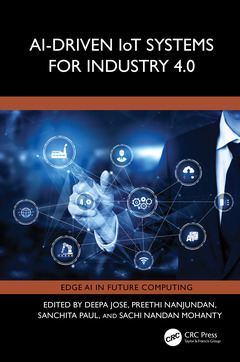Description
AI-Driven IoT Systems for Industry 4.0
Edge AI in Future Computing Series
Coordinators: Jose Deepa, Nanjundan Preethi, Paul Sanchita, Mohanty Sachi Nanda
Language: English
Subject for AI-Driven IoT Systems for Industry 4.0:
· 15.6x23.4 cm · Hardback
Description
/li>Contents
/li>Readership
/li>Biography
/li>
The purpose of this book is to discuss the trends and key drivers of Internet of Things and AI for automation in Industry 4.0. IoT and AI are transforming the industry thus accelerating efficiency and forging a more reliable automated enterprise.
AI-Driven IoT Systems for Industry 4.0, explores current research to be carried out in the cutting edge areas of AI for advanced analytics, integration of IIoT solutions and Edge components, automation in cyber-physical systems, world leading Industry 4.0 frameworks and adaptive supply chains etc. The book is broken up into five parts. Part one provides an overview of Industry 4.0, it describes the challenges in digital transformation and automation. Part two discusses digital connectivity and sensors. Part three explores intelligent thinking and data science for Industy 4.0, and AI for optimal decision making. Part four of the book explores automation in Industry 4.0 and hybrid edge computing architecture for automation. The last part examines industrial IOT and edge AI. It presents edge AI powered visual insights using cloud computing for smart factories. It also discusses the potential use of AI in construction of digital twins for speeding up product development lifecycles to identify and predict potential production problems based on sensor data and to suggest decisions in design or process changes in smart factory.
The book provides insights into role of deep learning and AI in speeding up product development lifecycles through automation. This book is intended for undergraduates, postgraduates, academicians, researchers, and industry professionals in industrial and computer engineering.
Chapter 1- A Novel Hybrid Approach based on Attribute based Encryption for Secured Message Transmittal for Sustainably Smart Networks
Chapter 2- Object Detection Using Deep Learning(DL) and OpenCV Approach
Chapter 3- Enhancing Industrial Operations Through AI-Driven Decision Making in the Era of Industry 4.0
Chapter 4- Acne detection using convolutional neural networks and image processing technique
Chapter 5- Key Driving Technologies for Industry 4.0
Chapter 6- Opportunities and Challenges of Digital Connectivity for Industrial Internet of Things
Chapter 7- Malicious QR Code Detection and Prevention
Chapter 8- Integration of Advanced Technologies for Industry 4.0
Chapter 9- Challenges in Digital Transformation and Automation for Industry 4.0
Chapter 10- Design and Analysis of Embedded Sensors for IIoT: A Systematic Review
Chapter 11- AI FOR OPTIMAL DECISION MAKING IN INDUSTRY 4.0
Chapter 12- Challenges in Lunar Crater Detection For TMC-2 obtained DEM Image Using Ensemble Learning Techniques
Chapter 13- A Frame Work of Intelligent Manufacturing Process by Integrating Various Function
Chapter 14- Adaptive Supply Chain Integration in Smart Factories
Chapter 15- Implementation of Intelligent CPS for Integrating the Industry and Manufacturing Process
Chapter 16- Machine Learning-Enabled Stress Detection in Indian Housewives Using Wearable Physiological Sensors
Chapter 17- Rising of Dark Factories Due to Artificial Intelligence
Chapter 18- Deep Learning for Real Time Data Analysis from Sensors
Chapter 19- Blockchain as a controller of security in Cyber-physical Systems - a watchdog for Industry 4.0
Chapter 20- ENERGY MANAGEMENT IN INDUSTRY 4.0 USING AI
Chapter 21- Deployment Of IOT With AI For Automation
Chapter 22- A Comparison of the Performance of Different Machine Learning Algorithms for Detecting Face Masks
Dr. Deepa Jose is a Head Researcher at KCG College of Technology, Chennai and Professor/ Department of Electronics and Communication. She is an IEEE Senior Member and IEEE Women in Engineering Chair. She is also a life time member of IEI. She has more than 5 years of teaching experience. She has published more than 60 research papers in Journals, International Conferences in India and abroad. She is a member of Technical Committees of conferences and journals. Her areas of research interest include VLSI for Wireless Communication, Deep Learning, Biomedical Signal Processing, IOT for healthcare, GIS initiatives, Soft Computing and AI. Dr. Sanchita Paul, she is presently working as Associate professor in BIT Mesra, Ranchi, Jharkhand. She received her Ph. D Degree from BIT Mesra, Ranchi, Jharkhand in the year January 2012. She received her M. Tech Degree from BIT Mesra, Ranchi, Jharkhand in 2006. and BE Degree from Burdwan university, West Bengal in 2004. Her research areas include Artificial Intelligence, Cloud Computing, Internet of Things, Machine Learning and Deep Learning. She has published 50 International Journals of International repute. She also has 5 patents in area of health informatics, IoT and Cloud Computing.
Dr. Preethi Nanjundan is an Associate Professor (SRG) in the Department of Data Science at Christ University, Pune, Lavasa campus , Maharashtra, India. She received her Doctorate degree from Bharathiyar University Coimbatore in 2014. She received her Master of Philosophy in computer science from Bharathiar University in 2007 and earned Master's degree in Computer Applications from Bharathidasan University in 2004. Her research and teaching experience spans 18 years. Besides publishing over 20 papers in international refereed journals, she has contributed chapters to various books and published 5 books. Four of her patents have also been granted. In 2020, she received the Best Professor award from Lead India and Vision Digital

